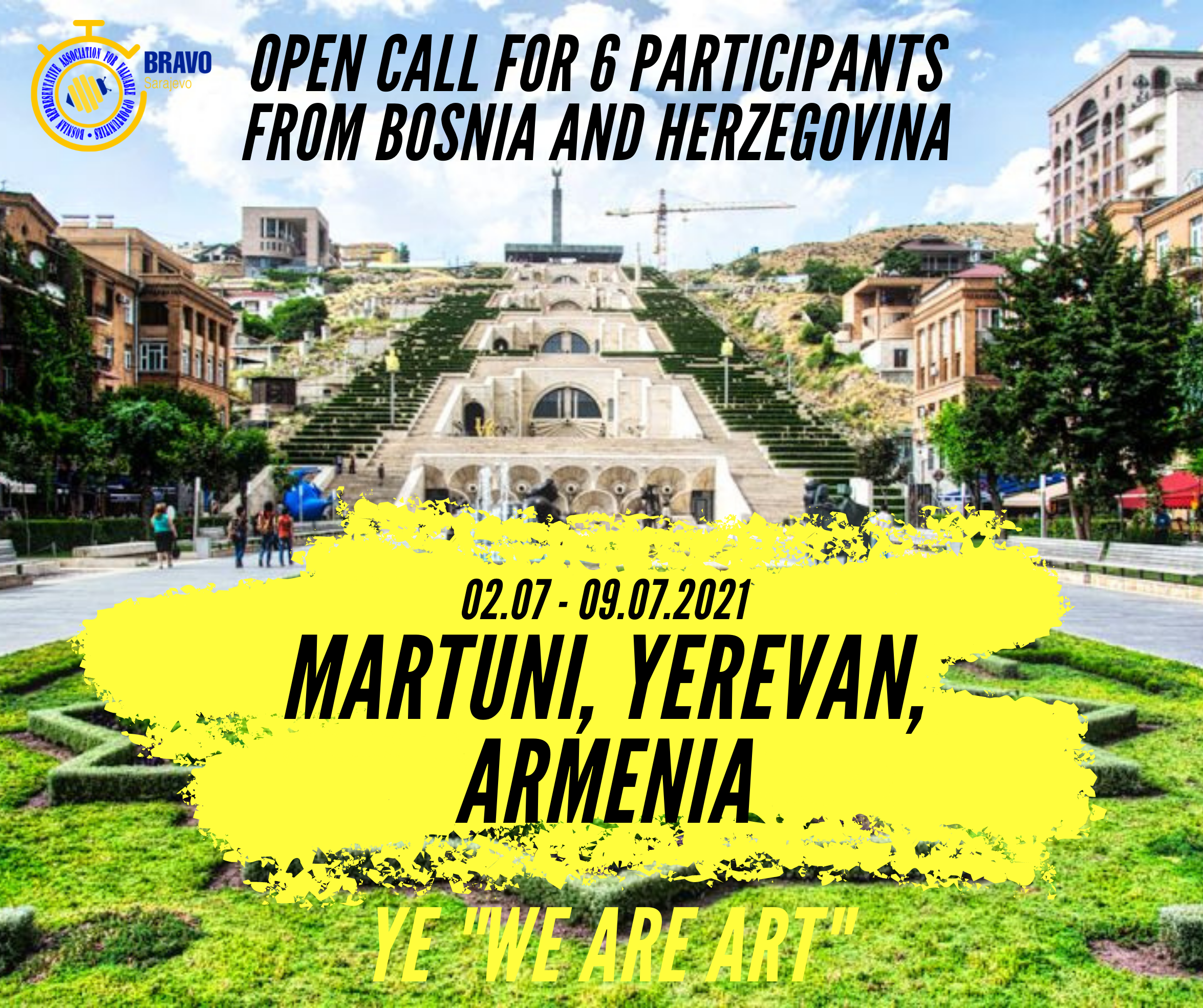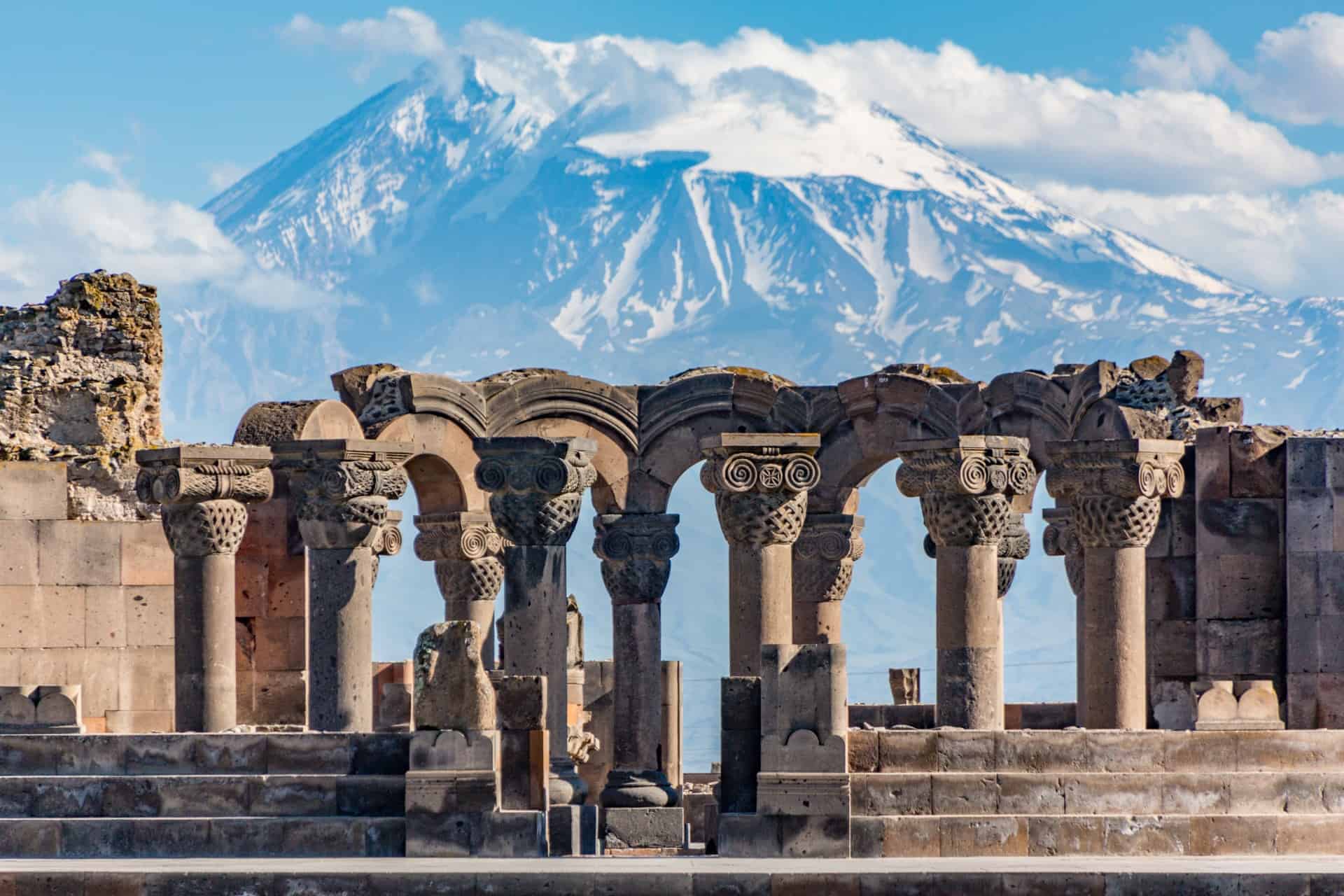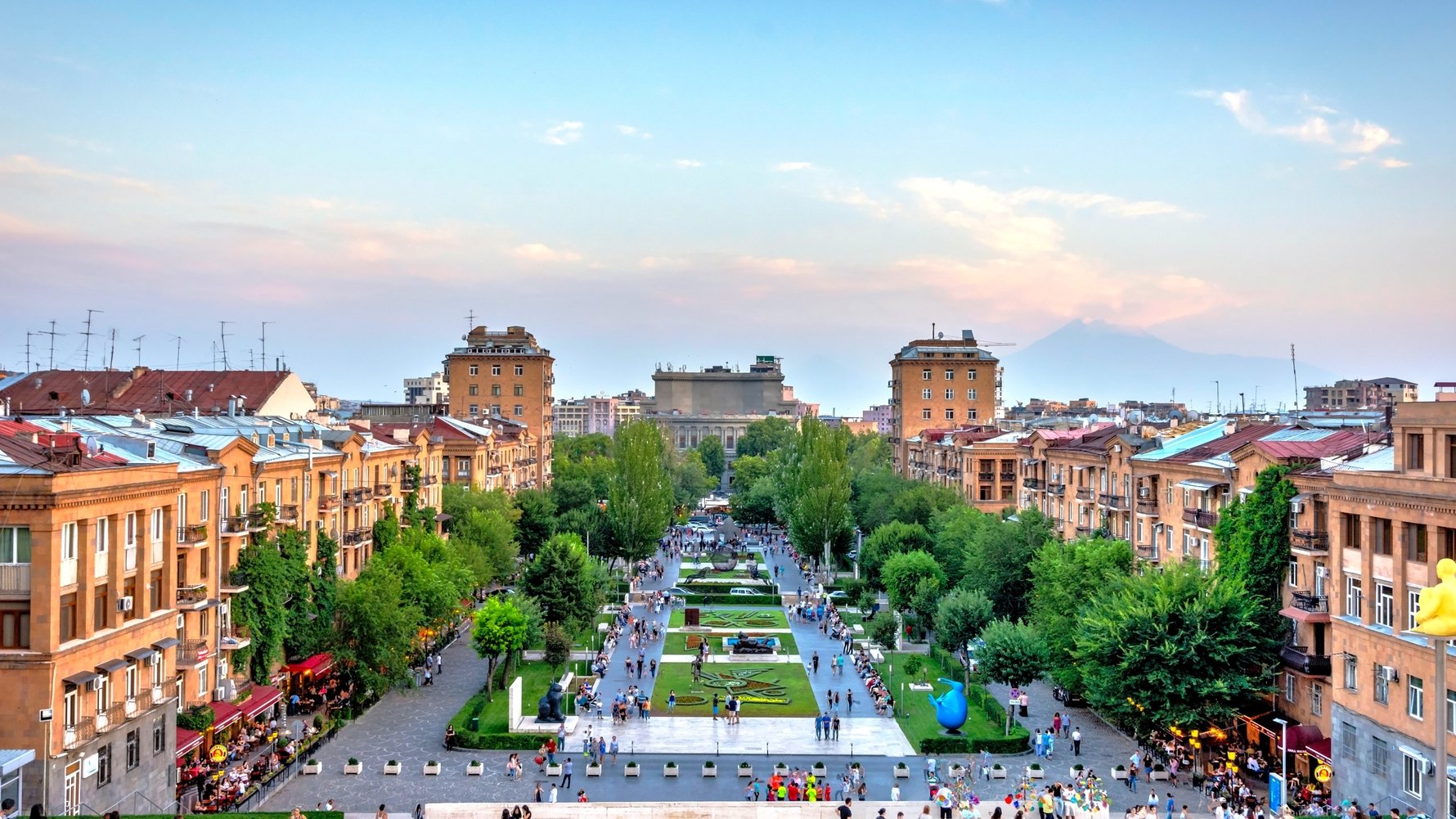Open call for 6 participants for Youth Exchange in Yerevan, Armenia

- Name of the project: YE “We Are Art”
- Date of Project: 02.07.2021 – 09.07.2021.
- Hosting organization: “Future in Our Hands Youth NGO ”
- Applicant organization: “POKHARA”
- Sending organizations: “BRAVO“
- Place: Martuni, Yerevan, Armenia
- Participants age: 16+
- The number of participants: 5 + 1 country leader
- Working language: English
- Deadline for applying: 30.05.2021.
This project is financed by the European Commission through the Erasmus Plus Program. This publication reflects the view only of the author, and the European Commission cannot be held responsible for any use which may be made of the information contained therein. By Erasmus+ rules organizers will cover travel costs, accommodation and food.
OBJECTIVES
The “We are Art” project is of interest to all participating partners, as we all work with young people with fewer
opportunities, who share concerns and interests. It will take place in Martuni, Armenia, from 02.07 – 09.07.20201. Bosnia, Malta, Montenegro, Romania, Spain and Armenia will form a group of 36 people, 6 from each country, which will work on social issues and problems that are of interest and concern to the young participants, through the expression of art .
Art projects offer a variety of very positive results for both those who express it and those who receive it, ranging from health and wellness benefits, a greater knowledge of our culture and / or our person, or an increase in creativity and ingenuity.
This project can create a flexible and creative process that guarantees equal access to art for all participating groups, all of them with fewer opportunities for different situations. Today we can see the lack of self-esteem and active participation among young people. Many young people are even afraid to speak, to express, to communicate. They are very talented, but do not usually communicate their fears, problems, and views. Added to this is the lack of general support from society and the authorities to facilitate this inclusion and take their points of view into account. The inclusive arts incorporate a variety of different creative practices including theater, dance, visual arts, writing, music, and clay. Inclusive practice provides the foundation for a full life, through its ability to support self-expression, well-being, community connection, and social cohesion. Participation in inclusive arts programs contributes to the ability of individuals. This development builds confidence, increases self-esteem and active citizenship. Through this project, we want to create a platform for young people to talk about the problems they see in their community and to transfer what they have learned to the society in which they live. They will facilitate the development of expression and communication skills, they will develop their cultural awareness, how they can speak through art and make their problems visible to the public. They will be able to express and share the social problems found in their environments, simply because they are teenagers, and because of their added personal situations.
- The OBJECTIVES of the project are:
– Increase the self-esteem, empowerment, creativity and cultural awareness of the participants through art
– Promote equity and inclusion among different groups of young people with fewer opportunities
– Promote social inclusion, active European citizenship and youth participation
– Give visibility to youth with fewer opportunities
– Increase European awareness in the field of youth
Activities:
The exchange will take place in Martuni, an urban town in Armenia, on the shores of Lake Seval. This place has
been chosen because it is very quiet, you can be in contact with nature, which will lead to being more calm and
creative, and it has public places with an influx of people in summer to carry out the Art Festival final. In addition,
the young people of this small town are not in contact with this type of project and the possibilities it offers, so it
will be used to invite them to take part in certain activities and, above all, the final event. FIOH collaborates with
the entity “Voske Porik”, which works with young people with disabilities and with fewer opportunities in this town,
so they will be involved in many activities, giving these young people the opportunity to participate in international
mobility.
The dates are initially set for the beginning of September, since this is when the participants have not yet started
classes in most countries, but given the circumstances (Covid19), we will be forced to set the dates according to
what the governments dictate and recommend. Armenia, Bosnia, Montenegro, Romania, Malta and Spain will
participate, with 5 participants and one leader each, between 16 and 19 years old. In addition, we will have the
collaboration of young specialists in each of the artistic techniques used during the performance.
Social topics of interest to young people will be worked on through different artistic techniques, such as dance, theater, music, writing or clay modeling. Inclusive art will be worked as a group. Although there are activities in which it is necessary to focus on oneself, later there will be a pooling to take advantage of the personal experience as a group. Young people will be given adequate time and conditions to express themselves fully, using the language that is most comfortable for them. During the preparation phase all the meetings will be group, although if any participant requires it, individual sessions will be held. The objective of these sessions is to make them aware of everything we are going to do, what things they should do during the execution, barriers they may encounter on the way, etc. During the execution, each artistic specialty will have its group of participants. They will carry out workshops in which they will learn more about the technique in question, what it can offer them and what they can offer through it.

The general line of activities carried out to achieve the objectives is as follows:
– Icebreakers and activities to get to know each other
– Activation and motivation activities
– Team building and trust activities
– Roleplaying and simulations
– Intercultural and experiential learning
– Art workshops and creative work sessions
– Activities prepared and led by the participants
– Brainstorming and discussions
– Meeting with local organizations
– Activities related to prejudice, discrimination, racism or xenophobia
– Night activities and free time
Participants will attend a round table, to be organized in conjunction with local NGOs
– Session led by specialists who will talk about inclusion and the importance of inclusion and how art can help
inclusion
IMPACT
This project is expected to have a huge impact on the participants, partner entities and young specialists in
different types of art.
All of us partners are very used to working with young people with fewer opportunities, so we are given a unique
opportunity to improve our methodologies and our daily work with young people. This will broaden our horizons
as entities, and will also give us the opportunity to extend European values and principles beyond our borders. We will gain resources to put them into action in our daily work and thus improve our methodology and the results
obtained with young people.
All the entities will share our work methodology and we will get many positive points from here to implement in
our day to day. We will expand knowledge and we will be able to start it with our young people.
The impact of the project will be seen through the development of capacities of the organizations, such as new
knowledge, experience and new initiatives. We plan to create new networks, enhance relationships between our
partners and find new partners among participating entities.
It is intended to carry out more projects within the framework of Erasmus +, on inclusion and inclusive art, using
this network.
For the participants, it is intended that the impact be even greater than that of the entities. On the one hand, it is
important to highlight the impact that
activity of the final event will have on them. It will be a unique opportunity for young people to learn to manage,
coordinate and execute this type of
events. They will learn a lot about the steps to follow so that everything goes well; They will have to contact the
relevant people to request permits, they will have to see what material is needed and take care of buying them
and that nothing is missing. This will also increase their motivation as they will demonstrate to themselves that
they are capable of doing whatever they set their mind to, and that if they have any ideas in mind they will now be
able to carry them out without fear of failure and using a creative way to do so.
Using the methods and activities mentioned in the project, participants will become more aware of the benefits of
inclusive art, seeing it as a tool for social inclusion and to create active citizenship. The participation of young
people with fewer opportunities in educational programs will be increased, specifically Erasmus +, which will lead
to their active participation in the development of their community.
It will increase your awareness and understanding of other cultures and countries. In general, participants who
face social, economic or geographic problems, among others, will have more opportunities, which will lead to
increased empowerment. They will learn to communicate and relate better. They will have more capacity for
inclusion and acceptance of the unknown.

ABOUT HOSTING ORGANIZATION
• To develop solidarity and promote tolerance among the public • To encourage public participation and strengthening links between local groups, schools, businesses and municipal authorities.
• To stimulate participation of young people for involvement in activities related to personal and social development activities for social adaptation of marginalized youth communities.
• To carry out active work for sustainable social development and democratic principles to promote civil society.
• To work for action and measures to restore and improve the quality of the environment.
• To improve the welfare of disabled people – their acceptance and finding a place in a family in a circle of peers, colleagues, friends and the m iddle part of the community in which they live.
• Ensure including accepting and encouraging environment for children and youth with disabilities.
• To counteract negative social phenomena, spreading in a youth environment, such as: crime, aggression, addiction, prostitution, xenophobia and others.

Yerevan city
Yerevan, also spelled Erevan, Erivan, or Jerevan, capital of Armenia. It is situated on the Hrazdan River, 14 miles (23 km) from the Turkish frontier. Though first historically recorded in 607 CE, Yerevan dates by archaeological evidence to a settlement on the site in the 6th–3rd millennia BCE and subsequently to the fortress of Yerbuni in 783 BCE. From the 6th century BCE it formed part of the Armenian kingdom.
The city developed as an important focus of trade and has had a long history of siege and storm. At different times it came under the Romans (a ruined fortress remains), Parthians, Arabs, Mongols, Turks, Persians, Georgians, and Russians. In 1582 it fell to the Turks, in 1604 to the Persians, and finally in 1827 to the Russians. In 1920 Yerevan became the capital of the independent Armenian republic. It remained the capital during the periods of Soviet rule and of renewed independence.
Modern Yerevan, which climbs the hillsides from the deep trench of the Hrazdan, is an attractive city in a fine natural setting framed by the extinct volcanic peaks of Mount Aragats and Mount Azhdaak to the north and Mount Ararat across the Turkish frontier to the south. Many modern buildings along its tree-lined streets have been constructed in traditional Armenian styles and of variously coloured local stone. Yerevan is a major cultural centre, with a university founded in 1919 and many other institutions of higher education. The Armenian Academy of Sciences (est. 1943) is the most prominent of the many research institutions in the city. The Matenadaran archives (founded 1920) hold a rich collection of ancient Armenian manuscripts, such as the Lazarus Gospel of 887. Yerevan also has many theatres and museums.

How to apply?
- Complete the BRAVO- APPLICATION FORM with CV and Motivation Letter in English title as following ”name of the project you are applying for” until 23:59 on deadline day.
- Deadline for applying: 30.05.2021.
- Selection results: 05.06.2021.
- PARTICIPATION FEE: NO PARTICIPATION FEE
- If you have any questions don’t hesitate to contact us at: office@bravo-bih.com
